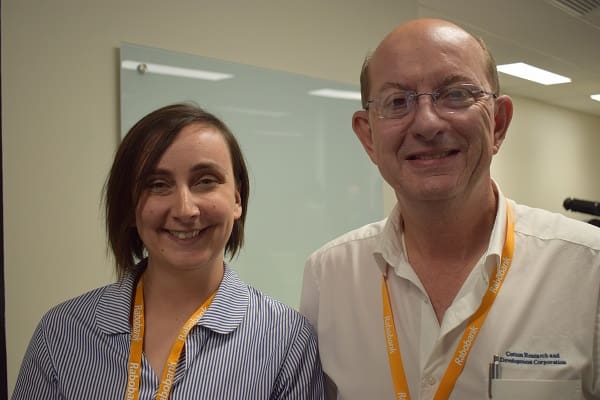By Neil Lyon
THE COTTON Research and Development Corporation (CRDC) has launched a five-year strategic research and development plan from 2018 to 2023 that aims to create an additional $2 billion in gross value of production for Australia cotton.

Queensland University of Technology senior lecturer, Alice Payne, and CRDC executive director, Bruce Finney.
Speaking at the 2018 Australian Cotton Conference on the Gold Coast, CRDC executive director, Bruce Finney, said the current average value of production was $1.9 billion, so the extra $2 billion target was a very ambitious goal.
“By 2023 we want to increase the average annual gross value of production from $1.9 billion to $3.9 billion,” he said.
“It is timely given the digital revolution and availability of new transformative technologies, and the growth in the cotton industry in the north and the south.”
Mr Finney said there were many opportunities to adopt new approaches to farming and apply new technologies to not only improve productivity and profitability, but also sustainability.
“Often the flip side of improving natural resource use is reducing the impact on the environment. For instance, if you improve water use efficiency or nitrogen use efficiency you will actually improve the situation with greenhouse gas emissions. So, it is a win-win,” he said.
Mr Finney said one of the exciting new opportunities was the potential for using cotton in the forming of Kevlar.
“Because cotton is the purest form of natural cellulose it potentially has characteristics that make it more favourable for using in the production of Kevlar which is worth $40,000 a tonne as opposed to cotton which is worth $2000/t,” he said.
Mr Finney said the new research strategy would be done in collaboration with a wide range of key players.
“We are looking to link up with the world’s best researchers, not just in Australia but globally, and not just the public researchers, but equally commercial partners,” he said.
“And we want to engage the start-up community because we think they can add a lot of value to existing industry research knowledge. They bring some nimbleness, energy and customer focus that adds value to the long standing, deep research knowledge we have.”
Source: graincentral.com

